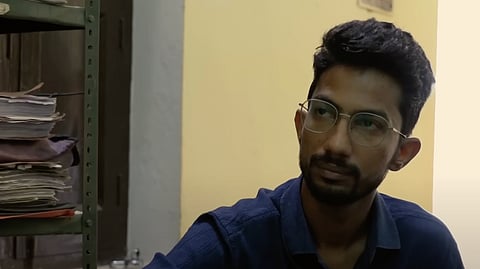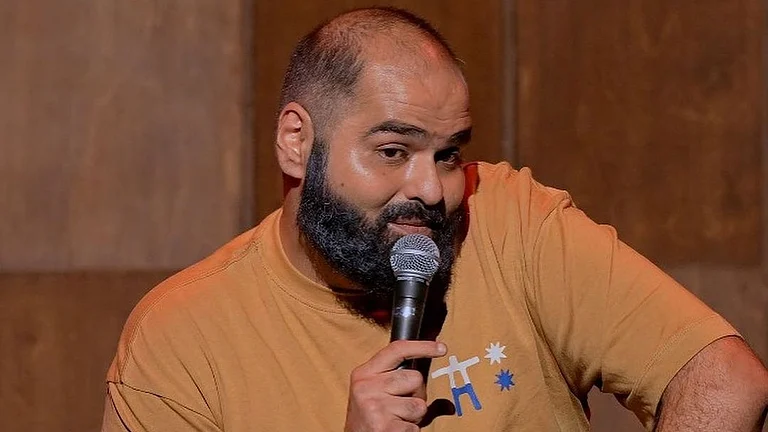Varrun’s Jamoora (Jester) sets out with a noble mission. A stand-up comic, Shyam—famous for mimicking PM Narendra Modi’s voice—wishes to contest the 2024 general elections in Varanasi, a right guaranteed to him by the Indian constitution. Shyam announced his decision in the aftermath of the BJP candidate’s unopposed victory in Surat, after the Election Commission (ECI) rejected the Congress candidates’ applications and all other candidates withdrew. There have been question marks over the ECI’s autonomy, a body meant to ensure fair elections.
Archiving the Death of Democracy: How ‘Jamoora’ Does What No Indian Film Has
Documentary filmmaker Varrun talks about the challenges of making a film that indicts the nation’s democratic processes, an artist’s social responsibility, and the rapidly depleting space to exhibit such films.
So Varrun and Shyam wish to investigate if our democratic machinery still works in 2024. There could be no downside: either the film records a historic victory, a courageous last stand, or exposes the rot in the world’s largest democracy. The result might not be shocking, but it’s still chilling. Jamoora is a simple, straight-shooting documentary that depicts Rangeela jumping through the hoops of bureaucracy simply to get his name on the candidates list in Varanasi. The film might be dealing with politically sensitive material, but it still manages to pack in plenty of quirk without drawing attention to its choices. In a way, it’s homecoming for Varun Grover, who wrote Masaan (2015) and the title song for this documentary—sung by Swanand Kirkire.
In a conversation with Outlook, Varrun talks about his initiation into documentary films, the mortal danger he and his crew faced during the making of Jamoora, how he and his producer, Kunal Kamra, wear their idealism lightly, and the shrinking space for political documentaries in India when censorial forces are the most vigilant. Excerpts:

Can you tell me about your background? When did your filmmaking journey begin?
I was born in Rajasthan, but I grew up in a small Konkan town called Khed, near Dapoli (in the Ratnagiri district). I went to a Marathi-medium school till the twelfth standard, and then moved to Pune for my higher studies. I did my MBA, but I don’t like to talk about it [laughs]. I wasn’t acquainted with media studies or films in any way, but I began learning the ropes at an ad agency. I come from a typical joint Hindu business family, where none of my relatives have anything to do with the arts. I was a part of social awareness campaigns, and somewhere around 2015-16, I began my own agency/production house. I shot my first documentary series on farmer suicides in Maharashtra. I travelled around 20,000 kms for 12 episodes. I think I must have interviewed hundreds of widows of farmers who had killed themselves. The series played on Zee Marathi, during primetime. One of my major concerns about documentaries was that they shouldn’t try to convert the converted. It has to reach the kitchens of our households.
Making socially-conscious films after working at an ad agency seems like a deliberate choice. When did you discover this spark of social justice within?
I don’t think I can pin-point a moment. I guess it has to do with me being in touch with the grassroots of this country, because of where I grew up. The school I went to, around 80% of the kids came from farming families. They were my friends, so I saw their family problems up close. Konkan is not known to be a region where farming is a lucrative profession—chhote chhote khet hote hain yahaan [the farming lands are tiny]. I can’t look at it as an outsider, because I feel strongly about my friends. I also relate with their problems on a visceral level. When we talk about farmer suicides, I don’t need to work too hard to picture it because my mind directly imagines all my friends.

How did you get in touch with Kunal Kamra? How did you convince him to put his money into ventures that will clearly not give him any return?
Through a WhatsApp group, we have some common friends. In that group, my film [Too Much Democracy] was being discussed. I didn’t have to do anything to convince him at all; he was already convinced when he reached out. He saw the film, and he gave me a call asking about how much we’d spent on the film, expressing interest that he’d like to co-produce it. The whole call was less than four minutes—the easiest producer meeting ever!
In Jamoora, you identify yourself as a filmmaker first. But would you agree that, in both your films, you have bordered on the crusader. What do you identify as now?
I’m an artist. It’s a relatively new phenomenon, where artists are apolitical and only do commercially lucrative work. I think the job of an artist has always been to reflect society’s oppression, no matter whose government it is. I don’t think either Kunal or I feel like crusaders when we’re undertaking these projects. In our books, this is the most natural reaction to things happening around us.
While freedom of expression still remains a constitutional right, if we don’t speak up now then what good is it? Do we wait till the system becomes fully autocratic? Sometimes people give me too much credit.I’m just using the recourse available to me as a conscious citizen.
There’s clearly a risk with the films you’re making—some of which we see in Jamoora. Why take the risk at all?
[Laughs] There’s an element of risk in most things you end up doing in life. The bigger risk is not telling these stories. I don’t want to be thinking about a time in the future, where I wish I’d dealt with these things while they were still solitary or smaller in scale. Any artist should have a certain level of foresight—if Kunal hadn’t petitioned against the IT Rules, our film might not be allowed to release on YouTube. If we didn’t make this film, maybe even a relatively less ‘political’ film might not end up getting made. The cost of doing nothing is more than the risk of making such a film. I wish to be answerable to my five-year-old. If she grows up in an autocratic nation, I should be able to face her and tell her that we did everything within our powers to prevent it from happening.
Seeing how blatantly the electoral process is rigged against the citizens of this country, did it ever shake your belief in democracy and make you feel powerless?
I did feel powerless on the night when Shyam was supposed to take his oath as a candidate. The oath had to be taken before 11:59 pm, and we were at the office around 10 pm. The District Magistrate used the filthiest language to admonish us, I felt humiliated to say the least. He told the cops to throw us out of the premises. How can a bureaucrat talk to any tax-paying citizen like this?
What was the scariest bit while filming Jamoora that didn’t make it to the final cut?
On the day Shyam was filling his form, we were outside the polling office doing a regular shoot. Around 30-40 ranking police officials wearing riot gear surrounded my cinematographer. He’s just a young man, and I was scared for him, but he kept his composure. I wanted to immediately go and rescue him, but the lawyer with us advised me against it, saying that might make things worse. So he went and talked to the cops, and they momentarily let him off. There were some right-wing goons as well, egging them to confiscate his camera. When he was let off, we immediately told him to lay low for a bit. They were talking about detaining him overnight. I wouldn’t mind being picked up because I understood the risks going in, but I was scared for my crew member. They’re my responsibility.
We saw many people, who showed up in Varanasi to become a candidate like Shyam. Kunal and Shyam at least have a social media following, where they can broadcast their views and injustice happening to them. But these other people, they simply showed up. I always tell everyone that it’s because of the perseverance of these nameless, faceless heroes that our democracy is still standing. Celebrities come and go.

If not for Kunal Kamra’s YouTube channel, your films would’ve been among political documentaries that don’t see the light of the day. What do you think of this time, when most of our most (brilliant) non-fiction work is not able to reach people, because of the strict self-censorship by platforms, filmmakers, and other censorial forces?
I don’t blame OTT platforms. They’re not artists, they’re business people. Platforming one political film will significantly impact their revenues, drawing interference from the establishment. They’re doing what they have to. The problem is when such platforms distance themselves from filmmakers even when the project is not political in nature. For example, I’ve made a couple of political documentaries, but if a platform doesn’t entertain a love story written by me because of my previous work, that’s really problematic. Don’t treat anyone as an untouchable.
Films like yours are so important from an archival point-of-view. Is there a way to build a sustainable business model around political docs? Or will it depend on the patronage of the politically conscious and affluent?
There could be a business model, but it’ll be tricky. I think Too Much Democracy has around 8 lakh views on Kunal’s channel alone. The challenge here is as long as projects remain independent, the voice can be as fierce as possible. Within a business model or a quasi corporate set-up also, the voice could get diluted or even corrupted. I fear that. It’s easier to corrupt a faceless system, rather than an individual I believe.
Both Too Much Democracy and Jamoora paint a damning portrait of the current government. Have you got any surprising reactions from a BJP supporter?
There was this one screening near Baramati, which I announced would be the last screening of the film. This boy in his early 20s stood up and said he was a ‘bhakt’—and that he spent most of his time trolling anti-government handles. He said he came accidentally to the screening, and that he would now think twice about doing what he was doing. He requested me to not stop screening the film, as it was the only way to tell people that there are different versions to the truth.
In Pune, after a screening a man in his 50s came up to me and apologised. I asked him why he was apologising, and he said that he had forwarded many Khalistani messages at the time of the farmers’ agitation.We,Indians, are an emotional bunch. No amount of reports, data can convey the truth to us, like storytelling can. Telling people about injustice through a film or a play is a sure-shot way to impact them—something no amount of intellectual discourse, reportage will achieve.

